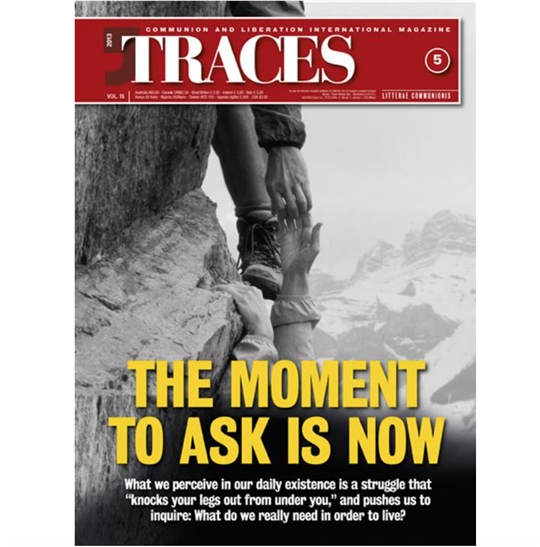
Traces N.5, May 2013
How Can One Live?This is one of those questions that causes you to start, not in a manner of speaking, but literally, because it shifts you all of a sudden, opening a different horizon in a space that seemed fenced in and closed by other questions. At least, this is what happened to many present in different parts of the world during these months at the Spiritual Exercises of the Fraternity of Communion and Liberation. At a certain point in the itinerary that Julián Carrón had just begun, one already full of decisive questions (“When the Son of Man returns, will He find faith on the earth?” “Do I believe or not?” “What remains of the fascination of Christ?”), Fr. Giussani’s words rang out: “The great problem of today’s world is no longer an inquiring theorization, but an existential question. Not, ‘Who is right?’ but, ‘How can one live?’ Today’s world has been reduced to the level of evangelical poverty. In Jesus’ time, the problem was how to live, not who was right; this was the problem of the scribes and Pharisees.”
These words were from 1991, but they seem to summarize the malaise we experience here and now, in a situation twisted in on itself like a screw, in which the problem of “who is right” has been carried to the extreme, to the idea that the other is an objection to eliminate rather than a good to take into consideration. We see it in the way we often face politics, work, family, and relationships, as if the decisive point were theories, ideas, some solution that can “settle” our problems, and not the drama of living that we bear within and that makes such problems useful, even precious, in some way, notwithstanding the difficulty, because, as Fr. Giussani reminded us, “in the face of questions, problems, and difficulties, that which man loves comes to the surface.” The stronger the malaise and the harder and deeper the problems, the greater is our need to strip them of the intellectualism, the chatter, and the superficiality, down to the necessary basics: “evangelical poverty” and the question of how one can live, what use faith is in all this.
This is a question that we have already asked ourselves many times. Deep down, it is always the same question, but none is more decisive for life and faith, because a faith that does not help us live is useless. Seen another way, faith is confirmed and made indispensible for us when we see that it responds to “that which characterizes the human person today: doubt about existence, fear of living, fragility, lack of substance in ourselves....”
The Spiritual Exercises booklet (available soon on our website and included with the next issue) travels this itinerary, and it should be meditated upon and explored because it is a decisive work for one’s life. The goal of this issue of Traces is to help us look deeply at our need, realizing how the greatest obstacle is often our resistance to facing it, as if we have within a strange resistance to asking, to opening wide the question of fulfillment that underlies our “toil in living.” Instead, when the event of Christ happens, one of the effects is that it makes us realize the importance of our need, the importance of what we are.
This is precisely what has been happening in these weeks because of the new Pope’s increasingly decisive steps, which often call us to go to the root of our “deepest need,” as these steps will be met on their path by “the only Saviour of the entire human person and of all people”–Christ.